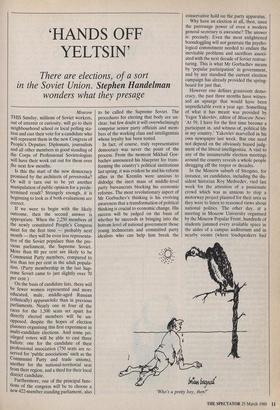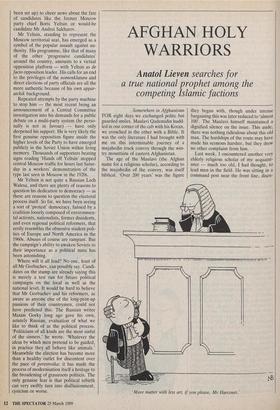'HANDS OFF YELTSIN'
There are elections, of a sort wonders what they presage
Moscow THIS Sunday, millions of Soviet workers, out of interest or curiosity, will go to their neighbourhood school or local polling sta- tion and cast their vote for a candidate who will represent them in the new Congress of People's Deputies. Diplomats, journalists and all other members in good standing of the Corps of Professional Sovietologists will have their work cut out for them over the next few months.
Is this the start of the new democracy promised by the architects of perestroika? Or will it turn out to be yet another manipulation of public opinion for a prede- termined result? Strangely enough, it is beginning to look as if both evaluations are correct.
If we were to begin with the likely outcome, then the second answer is appropriate. When the 2,250 members of the newly constituted People's Congress meet for the first time — probably next month — they will be even less representa- tive of the Soviet populace than the pre- vious parliament, the Supreme Soviet. More than 80 per cent are likely to be Communist Party members, compared to less than ten per cent in the adult popula- tion. (Party membership in the last Sup- reme Soviet came to just slightly over 70 per cent.) On the basis of candidate lists, there will be fewer women represented and more educated, male, middle-aged Russian (ethnically) apparatchiks than in previous Parliaments. Nearly one in four of the races for the 1,500 seats set apart for directly elected members will be un- opposed, despite the hopes of election planners organising this first experiment in multi-candidate elections. And some pri- vileged voters will be able to cast three ballots: one for the candidate of their professional association (750 seats are re- served for 'public associations' such as the Communist Party and trade unions), another for the national-territorial seat from their region, and a third for their local district candidate.
Furthermore, one of the principal func- tions of the congress will be to choose a new 422-member standing parliament, also to be called the Supreme Soviet. The procedures for electing that body are un- clear, but few doubt it will overwhelmingly comprise senior party officials and mem- bers of the working class and intelligentsia whose loyalty has been tested. In fact, of course, truly representative democracy was never the point of the process. From the moment Mikhail Gor- bachev announced his blueprint for trans- forming the country's political institutions last spring, it was evident he and his reform allies in the Kremlin were anxious to dislodge the inert mass of middle-level party bureaucrats blocking his economic reforms. The most revolutionary aspect of Mr Gorbachev's thinking is his evolving awareness that a transformation of political thinking is crucial to economic change. His success will be judged on the basis of whether he succeeds in bringing into the bottom level of national government those young technocrats and committed party idealists who can help him break the conservative hold on the party apparatus.
Why have an election at all, then, since the patronage power of even a modern general secretary is awesome? The answer is: precisely. Even the most enlightened boondoggling will not generate the psycho- logical commitment needed to endure the inevitable problems and sacrifices associ- ated with the next decade of Soviet restruc- turing. This is what Mr Gorbachev means by 'popular participation' in government, and by any standard the current election campaign has already provided the spring- board for just that.
However one defines grassroots demo- cracy, the past three months have witnes- sed an upsurge that would have been unpredictable even a year ago. Something of what it has meant was provided by Yegor Yakovlev, editor of Moscow News. 'At 59, I have for the first time become a participant in, and witness of, political life in my country,' Yakovlev marvelled in his own newspaper last week. But one need not depend on the obviously biased judg- ment of the liberal intelligentsia. A visit to any of the innumerable election meetings around the country reveals a whole people shrugging off the torpor or decades.
In the Moscow suburb of Strogino, for instance, six candidates, including the dis- sident historian Roy Medvedev, vied last week for the attention of a passionate crowd which was as anxious to stop a motorway project planned for their area as they were to listen to reasoned views about national politics. The other day, at a meeting in Moscow University organised by the Moscow Popular Front, hundreds of students jammed every available space in the aisles of a campus auditorium and in nearby rooms (where loudspeakers had 'Who's a pretty boy, then?' been set up) to cheer news about the fate of candidates like the former Moscow party chief Boris Yeltsin or would-be candidate Mr Andrei Sakharov.
Mr Yeltsin, standing to represent the Moscow territorial seat, has emerged as a symbol of the popular assault against au- thority. His programme, like that of many of the other 'progressive candidates' around the country, amounts to a virtual opposition platform — with Yeltsin as de facto opposition leader. His calls for an end to the privileges of the nomenklatura and direct elections of party officials are all the more authentic because of his own appar- atchik background.
Repeated attempts by the party machine to stop him — the most recent being an announcement of a Central Committee investigation into his demands for a public debate on a multi-party system (he perso- nally is not in favour) — have only deepened his support. He is very likely the first genuine opposition figure inside the higher levels of the Party to have emerged publicly in the Soviet Union within living memory. Thousands of supporters bearing signs reading 'Hands off Yeltsin' stopped central Moscow traffic for hours last Satur- day in a workers' demonstration of the type last seen in Moscow in the 1920s.
Mr Yeltsin is not quite a Russian Lech Walesa, and there are plenty of reasons to question his dedication to democracy — as these are reasons to question the electoral process itself. So far, we have been seeing a sort of 'protest' democracy, fanned by a coalition loosely composed of environmen- tal activists, nationalists, former dissidents, and even regional political reformers, that eerily resembles the obsessive student poli- tics of Europe and North America in the 1960s. Abuses of course are rampant. But the campaign's ability to awaken Soviets to their importance as a political mass has been astonishing.
Where will it all lead? No one, least of all Mr Gorbachev, can possibly say. Candi- dates on the stump are already saying this is merely a test run for future political campaigns on the local as well as the national level. It would be hard to believe that Mr Gorbachev and his reformers, as aware as anyone else of the long-pent-up passions of their countrymen, could not have predicted this. The Russian writer Maxim Gorky long ago gave his own, astutely Russian, evaluation of what we like to think of as the political process. 'Politicians of all kinds are the most sinful of the sinners,' he wrote. 'Whatever the ideas by which men pretend to be guided, in practice they all behave like animals.' Meanwhile the election has become more than a healthy outlet for discontent over the pace of perestroika: it has made the process of modernisation itself a hostage to the broadening of grassroots politicis. The only genuine fear is that political rebirth can very swiftly turn into disillusionment, cynicism or worse.



















































 Previous page
Previous page